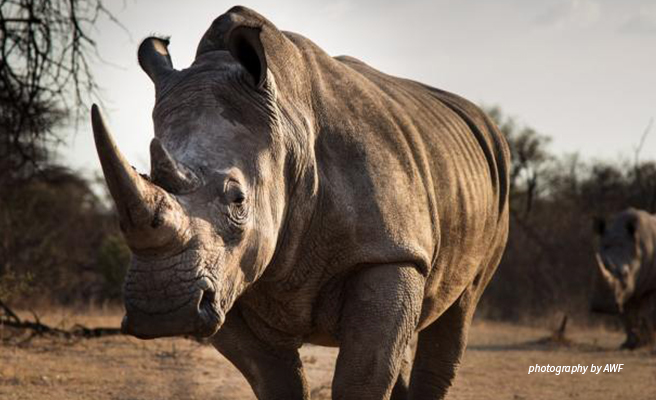AWF Campaign Garners Support for Global Wildlife Health And Pandemic Prevention Act

General Inquiries
Tel:+254 711 063 000
Ngong Road, Karen, P.O. Box 310
00502 Nairobi, Kenya
Call to Action for World Rhino Day Encourages Bipartisan Efforts to Stop the Trade of Endangered Species and Increased Diplomacy to Close High-Risk Wildlife Markets
WASHINGTON, D.C. AND NAIROBI, KENYA (September 22, 2020) – On World Rhino Day, African Wildlife Foundation (AWF) announced the results of a global letter-writing campaign raising awareness for new U.S. legislation designed to help regulate legal wildlife markets, close high-risk markets dealing in illegal and endangered species, and prevent future pandemics by curtailing the spread of zoonotic diseases. AWF’s effort in support of the bipartisan bill (S.3759), has generated 24,244 comments to date. A goal of 50,000 letters has been set.
The Global Wildlife Health and Pandemic Prevention Act aims to keep threatened and high-risk species from wildlife markets once and for all to prevent another global health crisis — and protect some of Africa’s most beloved wildlife.
Visit AWF’s online advocacy campaign supporting S.3759, including a running count of the submitted comments.
AWF External Affairs Director Edwin Tambara said: “We know that humans do not need to consume wildlife products to lead healthy lives, but that doesn’t erase that fact that nearly three billion people worldwide rely on wild-caught and farmed seafood as a primary source of protein. Making legal wildlife markets safer and weeding out the bad actors must take the form of pragmatic and smart policies that put an end to poorly-regulated commercial markets pose a serious risk in the spread of zoonotic disease.”
The bipartisan Global Wildlife Health and Pandemic Prevention Act (S. 3759), co-sponsored by Senators Chris Coons of Delaware and Lindsay Graham of South Carolina, aims to prevent future global health crises and, at the same time, will help tighten regulations on wildlife trade.
“The increasing demand for wildlife products, destructive land use practices, and climate change are not only threatening wildlife populations worldwide, but as we have seen with the COVID-19 pandemic, our health as well,” said Senator Coons. “We need to work together as a global community to close markets engaging in illegal and risky trade of wild animals in order to prevent another devastating pandemic and conserve wildlife.”
The legislation creates a framework for the U.S. Department of State, U.S. Agency for International Development, U.S. Fish and Wildlife Service, and the U.S. Department of Agriculture to address high-risk wildlife markets through international cooperation and diplomacy, including coordination with existing efforts to combat wildlife trafficking. This will reduce disease transmission by increasing global capacity for zoonotic disease prevention and detection and reducing human interactions with wildlife in the wild. An equal goal of the policy is to protect and support food insecure communities that currently depend on wildlife.
Tambara said: “Previous pandemics have been linked to unsafe activities at wildlife markets, and while the origins of the current COVID-19 pandemic are unknown, many Chinese patients at the epicenter of the Coronavirus have been linked to a large live animal market, according to the CDC.”
About World Rhino Day
AWF issued a species-related news release on September 22, 2020 with additional information about growing threats to rhinos and recent success stories from effective conservation efforts, which have decreased poaching and illegal wildlife trade.
About African Wildlife Foundation
The African Wildlife Foundation is the primary advocate for the protection of wildlife and wild lands as an essential part of a modern and prosperous Africa. Founded in 1961 to focus on Africa’s conservation needs, we articulate a uniquely African vision, bridge science and public policy, and demonstrate the benefits of conservation to ensure the survival of the continent’s wildlife and wild lands.
MEDIA CONTACTS: To arrange interviews with AWF staff working on conservation-related COVID-19 policy issues in Washington, D.C., please contact Patrick Mitchell of AWF at [email protected], (202) 991-7508 or Nashipae Orumoy of AWF in Nairobi, Kenya at [email protected], +254 701 864021.